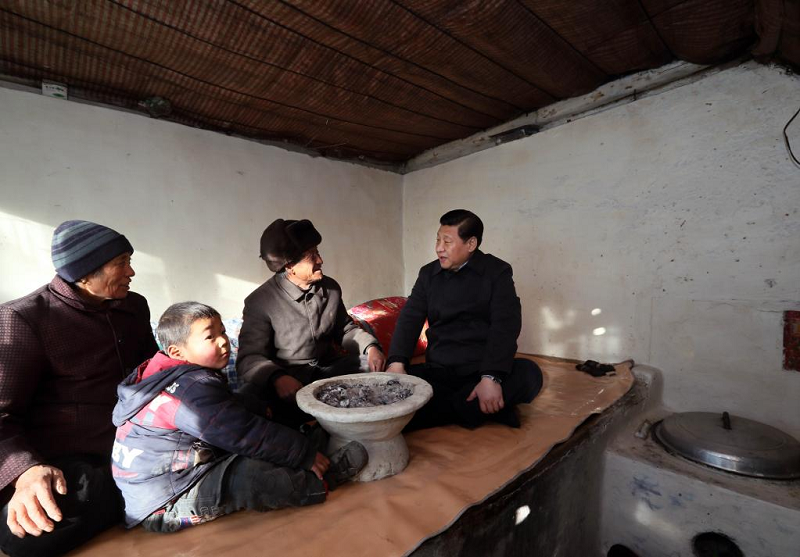Profile: With popular mandate, Xi Jinping spearheads new drive to modernize China

Xi Jinping visits the family of Tang Rongbin in Luotuowan village of Longquanguan township, Fuping county, North China's Hebei province, Dec 30, 2012. [Photo/Xinhua]
Xi was first elected to the Party's top post in late 2012. For the first time, the position was held by a person born after the founding of the People's Republic of China in 1949.
Since then, he has taken the nation on an ambitious path of revival, according to international media reports. Xi has a clear vision for China, to see it as a powerful country in the world, the reports said.
THE CORE
In 1969, Xi left Beijing for a small village on the Loess Plateau to live as a farmer, sharing the same fate as millions of youths who came of age during the Cultural Revolution.
For someone like Xi who grew up in Beijing, life in the countryside was extremely difficult at the beginning. Villagers often went without meat for several months. Despite the hardships, Xi looked back on this experience as the time when he truly understood the struggles of the common people and society.
This unique experience fueled Xi's determination to always do something for the betterment of the people.
While many of his college peers opted to go abroad, Xi applied to work in a poor county called Zhengding in Hebei Province in the early 1980s.
In 2012, soon after taking office as the general secretary, Xi visited poor rural families in Hebei. In Gu Chenghu's home, Xi sat on a heated brick bed and chatted with him.
"I have come here to check your living conditions and see what the Party's leadership can do more for you and people like you," Xi said.
He held up Gu's sleeve and showed it to the officials around him, saying, "Look, his coat is worn out. "
At the time, there were around 100 million rural Chinese living under the poverty line of earning an annual income of 2,300 yuan (about 366 US dollars).
In less than a year, Xi put forward the "targeted poverty alleviation" strategy, and over the span of about eight years sent 255,000 work teams and 3 million cadres to villages, providing one-on-one assistance to impoverished farmers.
Xi himself conducted over 50 inspections and research studies on poverty alleviation, which included visits to all 14 regions with high concentrations of extreme poverty.
On Feb 25, 2021, Xi announced that absolute poverty had been eliminated in China.
China's poverty reduction rate has been notably faster than the global average, making it the country with the largest number of people lifted out of poverty worldwide.
"If not for Xi's personal push, poverty reduction would have been even more difficult and taken longer," said Zeng Shoufu, who once worked as a village poverty alleviation cadre in Fujian province.
Another challenge was corruption. Upon taking the Party's top office in late 2012, Xi cautioned that "if corruption is allowed to spread, it will eventually lead to the collapse of the Party and the fall of the State. "
Less than a month into the job, he fired the first shot in his war against corruption. Over the course of ten years, high-ranking "tigers," including a former member of the Standing Committee of the Political Bureau of the CPC Central Committee, were taken down.
Over 500 centrally-administered officials, most of whom were at or above the ministerial level, were investigated. Crooked officials who fled overseas were brought back through anti-corruption operations initiated by Xi.
In 2018, he announced that an "overwhelming victory" against corruption had been achieved. But the campaign did not end there. After the 20th CPC National Congress, another nearly 20 senior officials were investigated or punished for corruption.
Early this year, at the plenary session of the CPC Central Commission for Discipline Inspection, the top graft-busting agency, Xi urged a crackdown on corruption that involves both political and economic issues. He emphasized the need to prevent leading cadres from becoming spokespersons or agents of interest groups and power cliques.
The success of poverty alleviation and anti-corruption has won Xi popular support, but this is not the only reason he was unanimously elected into the top office of the Party and the State. In the past decade, many long-standing problems in the country were solved under his leadership.
China has steadily developed and become stronger overall, with an average annual economic growth of 6.2 percent over the past decade. It was more than twice the global average. Per capita GDP has doubled to over 12,000 US dollars.
China's share of the world economy has increased from 11.3 percent in 2012 to 18.5 percent at present. The output of grain has consistently been abundant.
In the past, China's manufacturing industry was often referred to as "big but not strong." It took a billion pairs of socks to buy a Boeing plane, some said. Today, China has developed its own large passenger aircraft, and technological advancement contributes over 60 percent to the country's economic growth.
China's digital economy is the second-largest in the world, and its new energy vehicle production and sales have ranked first for eight consecutive years.
Shan Zenghai, a technician at the construction machinery manufacturer XCMG, recalled how in 2017, Xi toured the company's workshop and mounted an all-terrain crane.
"He gave us great encouragement, saying that the real economy should never be sidelined," Shan said. "He also said the Chinese economy must transition from high-speed growth to high-quality development. "



